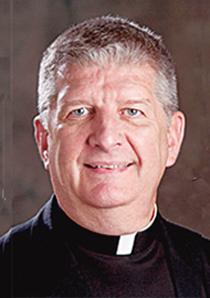
Faith
The parables teach us many lessons, or better, Jesus teaches us many lessons through his parables.

O'Grady
Jesus is certainly known, loved, and believed as the Eternal Son of the Father, the Word made flesh. He also has some other critical expertise among them as a great preacher using parables as a principal way of getting his message across and as a man of prayer.
Msgr. Antonio Pitta brings these two together in his "Notes on Prayer" -- The Parables of Prayer.
Five meditations based on five parables reveal more about Jesus' prayer.
That irksome friend rattles the neighbor's door, looking for bread. Not, however, for himself, but rather for friends of his who arrived unannounced and for whom he wants to provide hospitality. (cf. Lk 11:5-13.)
While the bread being sought is the baked kind, it can also be the bread that is sought in the Our Father, the "daily" bread, which is more than just the baked loaf but is as much a request for God's presence in our lives.
Thus, the request for this bread harkens back to the request the disciples made of Jesus to teach them to pray.
And the bread is not just being sought for himself but so that he can give it to others. He is interceding as we often do for other, either out of our love for them or because they seek our "prayerful" assistance.
Among the most known and loved of the parables is that of the Prodigal Son, or the Forgiving Father. (cf. Lk 15: 11-32.)
Above all, we see the mercy of God shining in the father's welcoming home of the wayward son. It is contrasted with the older son's pique at all the to do about the wayward's return.
There are a couple of references to the Our Father. Most obviously, the sons' address to their father. Indicating that we should approach God this way, whatever our perceived, imagined, or real condition in life -- sinner or saint. Likewise, the sons tell us we can go to the father begging for forgiveness and really expect it to be granted, or we can go to him with our gripes, as does the older son, and expect him to help reorient our vision about others.
How about the Pharisee, the publican or the tax collector in the temple? Did you ever think about this from the perspective of reality? Both men were telling the truth! Each about himself. (cf. Lk 18:9-14)
The publican had much to hang his head about -- he is a tax collector and collaborator with Roman Imperial occupiers. For the Jews, he is the lowest of the low. It's a wonder he got into the temple. The Pharisee was also telling the truth. He put his heart and soul, his diet and his wallet into being a good, even excellent, practicing Jew.
Notice the prayer of the Pharisee? It all begins with the first-person singular. But nothing like "I need you God." Rather, it's more "I give you thanks God for me!" Or even less subtly, "God, you were really smart because you created me." He made himself the focus of God's gifts, not the gifts.
The publican, destitute of any hope of redemption in life or death, throws himself on God's mercy with the simple "Lord, be merciful to me, a sinner."
There is a bit of the Pharisee in the older son, and there is a lot of the younger son in the tax collector.
Jesus is really teaching about the better way to approach God in prayer.
Tell him the problems, the dilemmas, the sins and ask for his guidance, direction, and forgiveness. Really ask him to give the grace of clear perspective about yourself and about him.
Near the end of Luke's Gospel, we see Jesus requiring the "praying always" of his disciples. And as usual, he sets the example in the Garden of Gethsemane, praying constantly even as the hour of his death approaches.
So, we have another place in the Scriptures to go where we can both encounter Jesus praying and teaching us to pray.
The parables teach us many lessons, or better, Jesus teaches us many lessons through his parables. A closer reading reveals he also teaches us about praying through his parables.
Msgr. Antonio Pitta leads us through this new way of meeting Jesus and letting him teach us.
Recent articles in the Faith & Family section
-
The end of marriageJaymie Stuart Wolfe
-
Parables of prayerFather Robert M. O'Grady
-
The least of theseArchbishop Richard G. Henning
-
Celebrating Black History MonthMaureen Crowley Heil
-
Rich in povertyScott Hahn























